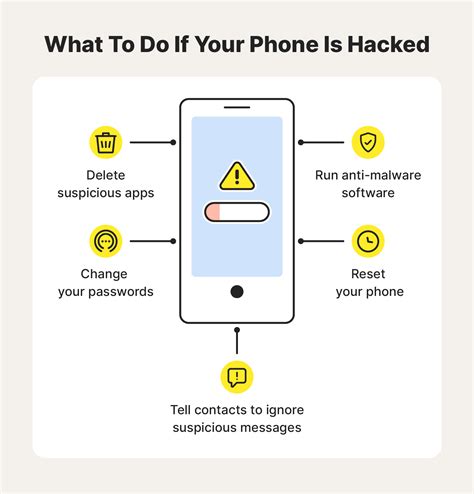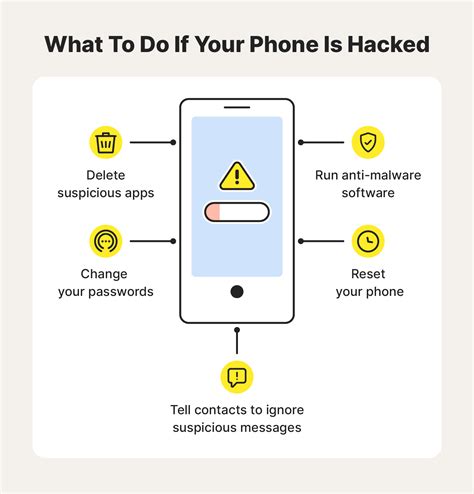With the increasing reliance on smartphones for daily activities, the risk of hacking has become a significant concern for mobile users. If you're wondering how to check if your phone is hacked, it's essential to understand the signs and symptoms of a compromised device. A hacked phone can lead to unauthorized access to personal data, financial information, and even location tracking. In this article, we'll explore the ways to detect and prevent phone hacking, providing you with the necessary knowledge to protect your device and sensitive information.
Key Points
- Unusual battery drain and overheating can be signs of a hacked phone
- Monitor your data usage and bills for unexpected increases
- Be cautious of suspicious apps and pop-ups
- Use antivirus software and keep your operating system up-to-date
- Regularly back up your data and consider using a secure messaging app
Common Signs of a Hacked Phone

A hacked phone may exhibit strange behavior, such as unusual battery drain, overheating, or slow performance. These symptoms can be indicative of malicious software running in the background, consuming system resources. Another sign of a hacked phone is unexpected data usage, which can result in higher bills or reduced data limits. Keep an eye on your phone’s behavior and monitor your data usage regularly to detect any unusual patterns.
Types of Phone Hacking
There are several types of phone hacking, including malware infections, phishing attacks, and unauthorized access to your device. Malware can be installed through suspicious apps, emails, or text messages, while phishing attacks aim to trick you into revealing sensitive information. Unauthorized access can occur when your phone is connected to an unsecured network or if you’ve used a public computer to access sensitive information.
| Signs of Hacking | Description |
|---|---|
| Unusual Battery Drain | Malware or spyware can cause excessive battery consumption |
| Overheating | Malicious software can lead to increased system activity and heat generation |
| Slow Performance | Hacking can slow down your phone's performance due to resource-intensive malware |
| Unexpected Data Usage | Hackers may use your phone to send or receive data, resulting in increased bills |

How to Check if Your Phone is Hacked

To check if your phone is hacked, follow these steps:
Step 1: Check for Suspicious Apps
Review your installed apps and look for any suspicious or unfamiliar applications. Check the app’s permissions and ensure that they are not accessing sensitive information without your consent.
Step 2: Monitor Your Data Usage
Check your data usage regularly and look for any unusual patterns or increases. You can do this by accessing your phone’s settings or contacting your carrier.
Step 3: Run a Virus Scan
Use antivirus software to scan your phone for malware and other malicious software. This can help detect and remove any potential threats.
Step 4: Check for Unauthorized Access
Check your phone’s settings and look for any unauthorized access or changes. Ensure that your phone is not connected to any unknown devices or networks.
Prevention is Key
Preventing phone hacking is crucial to protecting your sensitive information. Here are some tips to help you prevent phone hacking:
Use Strong Passwords
Use strong, unique passwords for your phone and accounts. Avoid using easily guessable information such as your name, birthdate, or common words.
Keep Your Operating System Up-to-Date
Regularly update your phone’s operating system to ensure you have the latest security patches and features.
Use Antivirus Software
Install and regularly update antivirus software to protect your phone from malware and other malicious software.
Be Cautious with Public Wi-Fi
Avoid using public Wi-Fi or unsecured networks to access sensitive information. If you must use public Wi-Fi, consider using a virtual private network (VPN) to encrypt your data.
What are the most common ways phones get hacked?
+Phones can get hacked through malware infections, phishing attacks, and unauthorized access to your device. Malware can be installed through suspicious apps, emails, or text messages, while phishing attacks aim to trick you into revealing sensitive information.
How can I protect my phone from hacking?
+To protect your phone from hacking, use strong passwords, keep your operating system up-to-date, and install antivirus software. Be cautious when installing apps or clicking on links, and avoid using public Wi-Fi or unsecured networks to access sensitive information.
What should I do if I think my phone is hacked?
+If you think your phone is hacked, immediately change your passwords, run a virus scan, and monitor your data usage. Consider resetting your phone to its factory settings and seeking professional help if necessary.
In conclusion, checking if your phone is hacked requires a combination of technical knowledge and vigilance. By understanding the signs and symptoms of a compromised device, you can take proactive steps to protect your sensitive information and prevent phone hacking. Remember to stay informed, use strong passwords, and keep your operating system up-to-date to minimize the risk of your phone being hacked.



